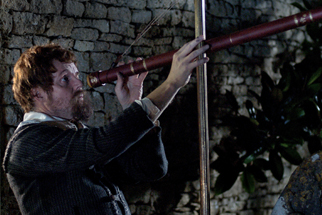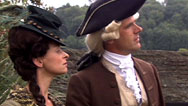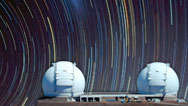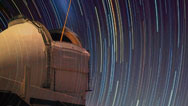Galileo and the Telescope
- By David Levin
- Posted 05.19.11
- NOVA
Galileo's observations of the night sky in the early 1600s confirmed a new model of the universe, in which the Earth orbited the sun—and not the other way around, as his contemporaries believed. But before he was studying the universe, Galileo was working on practical problems, and his early uses for the telescope weren't so scientific, says science historian Jim Bennett.
 Listen
Listen
Galileo's early uses for the telescope weren't so scientific, says historian of science Jim Bennett.
Transcript
Galileo and the Telescope
Posted: May 19, 2011
DAVID LEVIN: You're listening to a NOVA podcast. I'm David Levin.
Galileo has been called the "father of modern science." His observations of the night sky in the early 1600s confirmed a new model of the universe, where the Earth orbited the sun, and not the other way around. But before he was studying the solar system, Galileo was working on practical problems. And his early goals for the telescope weren't so scientific.
JIM BENNETT: Galileo is a practical mathematician. That's his trade. He designs instruments, he teaches the use of these instruments, and these instruments are often used for warfare.
DAVID LEVIN: Jim Bennett is a historian of science at Oxford University.
JIM BENNETT: Galileo's most famous instrument is a military compass, a thing for making calculations in gunnery. So when Galileo hears about the telescope, as any practical mathematician, he immediately thinks that there might be a way of capitalizing on this if you could see the enemy before he can see you.
DAVID LEVIN: So he started exploring telescopes as a commercial venture. If they had a military use, he could sell them like his other instruments. But ultimately, Bennett says Galileo wanted to do more than just make tools for soldiers and tradesmen. He wanted to tackle bigger questions, in a job with higher status in academia.
JIM BENNETT: Now, a mathematician's a fairly lowly status in the late 16th, early 17th century, in relation to the academic hierarchy. He'd much prefer to be a natural philosopher. You get paid more as a natural philosopher, for one thing. You're more respected, you're thinking about nature, which has got something to do with God, remember. Nature is God's work. So Galileo would much prefer to be dealing with nature, to be a natural philosopher instead of a practical mathematician.
DAVID LEVIN: Studying the inner workings of nature for a living was not an easy job to get, especially in the 1600s. But for Galileo, the telescope marked a turning point. It would eventually be the bridge between his success as an instrument maker and his goal of being a natural philosopher.
JIM BENNETT: The mathematical instruments that Galileo normally works with don't discover anything. They just solve your problems. They calculate things for you. They help you to kill your enemies and so on. But they don't give you any insights into the natural world. By turning the telescope to the heavens, Galileo enters a whole new regime of practice there, where this instrument can be used to discover things we didn't know before about the world. And that's very new.
DAVID LEVIN: But Galileo couldn't gain the status of a natural philosopher on his own. He needed some backup. A patron. So he turned to the grand duke of Tuscany and the Medici prince in Florence. At first, he didn't have much luck.
JIM BENNETT: The prince doesn't need a natural philosopher. He needs mathematicians, of course. Wars need to be won, buildings need to be built—all of that is mathematics. But this business of discovering new truths about the natural world is not something the prince needs. So Galileo has to play a very particular trick there. He has to convince the prince that he needs a natural philosopher and that Galileo is his man.
DAVID LEVIN: To do this, Galileo needed to come up with big ideas. If he published important work, he could dedicate it to the Medicis. And with that, he could land himself a patron—which meant fame and status. So he started tackling one of the biggest debates of his day.
JIM BENNETT: Is the Earth stationary at the center of the world, or is it a planet moving around the sun as the center? And Galileo sees opportunities with his telescope for really making an impact in that debate. That'll thrust him right into the center, and of course make Galileo a very famous and successful person.
DAVID LEVIN: Just six months after he started working with telescopes, Galileo got his big break. In January 1610, he discovered four mysteriously bright objects near Jupiter. They were moons, and by watching them over a few nights, he realized they were orbiting the planet. And that had huge implications.
ALBERT VAN HELDEN: The satellites of Jupiter were—they were just explosive. I mean, it was something entirely new, they were just coming out of left field. And he knew that he had something very spectacular.
DAVID LEVIN: Albert Van Helden is a science historian at the University of Utrecht in the Netherlands.
ALBERT VAN HELDEN: Now, that means that whatever theory you believe in, there has to be more than one center of rotation in the universe, okay? So in our case it would be the sun. Jupiter goes around that, the satellites of Jupiter go around Jupiter. So that's two centers of rotation. So that was a new piece of evidence, and its impact was immediate. Galileo became a superstar overnight.
DAVID LEVIN: This was the big idea Galileo had been looking for. In March 1610, he published his work in a book called Siderious Nuncius, or The Starry Messenger—and in it, he made a political move that would land him his long-sought patron. He didn't just announce the discovery of four planets or four moons—he knew that this was his big chance to impress the royal family of Tuscany, the Medicis. So he called them the "Medician Stars."
ALBERT VAN HELDEN: He puts the Medici in the heavens. What he got was patronage. He became the official philosopher and mathematician of the grand duke. And he became then a member of the supporting cast at the court in Florence. And he was one of the highest paid functionaries in Tuscany.
DAVID LEVIN: Thanks to the telescope, Galileo landed his dream job. And in the process, he paved the way for modern astronomy.
Credits
Audio
- Produced by
- David Levin
- Original interviews by
- David Axelrod
Image
- (actor as Galileo
- © WGBH Educational Foundation
Related Links
-

The Founders of Modern Astronomy
The Englishman William Herschel often gets the credit, but his sister Caroline was also a pioneer astronomer.
-

Hunting the Edge of Space: Hr 1
The Mystery of the Milky Way: From Galileo's to today's, telescopes have opened grand vistas onto our galaxy and beyond.
-

Hunting the Edge of Space: Hr 2
The Ever-Expanding Universe: Huge new telescopes are poised to penetrate the enigmas of dark matter and dark energy.
You need the Flash Player plug-in to view this content.

